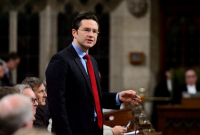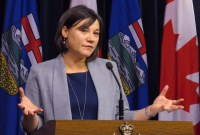Support strong Canadian climate journalism for 2025
If Ontario PC leader Doug Ford wins the election and sues the federal government to prevent carbon pricing, he would likely lose, say constitutional and environmental law experts.
The Progressive Conservative leader promised during the June 7 election campaign to repeal the province’s cap and trade program and has said he would fight the federal government’s carbon pricing plan.
“We’ll do whatever it takes to make sure our businesses are competitive,” he said in February. “The prime minister’s hurting businesses in this country by giving them an unnecessary tax.”
The federal Greenhouse Gas Pollution Pricing Act provides minimum federal standards for taxing pollution and fossil fuels, and allows provinces or territories to implement their own plans if they meet the standard. If the jurisdiction has no plan in place, or if their plans don't meet the minimum standards, the federal government’s “backstop” plan would be imposed on them.
If the provinces create their own price on carbon, it must meet or exceed the federal government’s “floor price” — starting at $10 per tonne this year and increasing by $10 each year to $50 per tonne by 2022.
Even before the legislation has been passed, Saskatchewan said it would fight the tax in court, and Manitoba threatened to do the same.
Lawyer predicts top court would uphold federal jurisdiction over carbon pricing
Saskatchewan Premier Scott Moe launched a constitutional reference case in the provincial Court of Appeal in late April. It will mark the first time a Canadian court has addressed the question of who has jurisdiction to regulate climate change.
An independent legal opinion by Winnipeg lawyer Bryan Schwartz for the Manitoba government in October indicated how that could go. Schwartz wrote that there was a “strong likelihood” that the Supreme Court of Canada would ultimately uphold the carbon pricing plan, probably on the basis of federal taxation powers.
Schwartz also wrote that the backstop nature of the plan was unlikely to render it unconstitutional because the court would “probably see the space given to the provinces to craft their own means of compliance as an exercise of ‘cooperative federalism.’”
Regardless of the legal opinion, Manitoba Premier Brian Pallister said he would take the federal government to court if it imposed the backstop plan on the province, which has proposed a flat rate of $25 per tonne – an amount that would only be compliant with the federal plan until 2020.
Jurisdiction over climate change regulation is tricky, because Canada’s constitution gives the federal and provincial governments shared jurisdiction of environmental issues. For example, the federal government directly regulate shipping and international waters, and the provinces handle industries like natural resources.
Nathalie Chalifour is an associate professor in the University of Ottawa’s law faculty and the co-director of the Centre for Environmental Law and Global Sustainability. She said in an interview with National Observer that there is so much overlap between provincial and federal legislation that federal environmental laws will naturally have ancillary effects on provincial jurisdiction.
The strongest argument may be that climate change legislation designed by either government must not encroach unduly on the other’s territory. But small overlaps are acceptable, said Lisa DeMarco, a senior partner at DeMarco Allan and an expert in energy and climate change law.
In the case of carbon pricing legislation, DeMarco said, the courts would be asking, “does it regulate an area of provincial jurisdiction, or is it necessarily incidental to enacting a broader climate change scheme?”
Strongest federal argument could be 'national concern'
An argument the federal government could make to protect the carbon pricing legislation is that it is regulating an issue of “national concern” under the peace, order and good government provision of the constitution, which spells out federal lawmaking authority in relation to the provinces. Chalifour said she believes that is the strongest argument in the government’s arsenal.
National concern is “attributed quite conservatively by the courts,” she said, but when they see an issue that could fit “they’ll allow it if it can be significantly narrowly designated.”
Chalifour said that because the federal government is seeking only to regulate greenhouse gas emissions, rather than industry itself, it could make a strong case.
In order to determine legislative issues of national concern, the courts will consider the implications if one province won’t comply, Chalifour said. In the case of carbon pricing, if one province tried to opt out “it has an implication for Canada’s ability to meet its greenhouse gas emissions, and it puts a bigger burden on other jurisdictions to reduce their emissions further.”
The federal government could also use its power to draft criminal law as a defense of the carbon pricing legislation, which it has done in the past to regulate toxic substances. Though environmental laws look nothing like typical criminal law, a 1997 Supreme Court of Canada decision determined that it could be classified as criminal if it had three elements: a prohibition, a penalty, and purpose for both, which the carbon pricing legislation does have.
The federal government could try to justify carbon pricing as taxation, or argue that it is part of its international treaty-making powers, with specific reference to the Paris Agreement on climate change. Chalifour said that would be “a trickier argument, but not impossible” based on previous court decisions around federal treaty-making power.
British Columbia and Alberta already have direct carbon taxes while Ontario and Quebec use a cap and trade system that caps a total amount of pollution and requires firms to buy credits if they want to pollute more than a prescribed amount.






Comments
All bets are off should Justin be ousted in 2019.